List
| President | Previous 1 | Previous 2 | Previous 3 | Previous 4 | Occupation | State [d] | ||
|---|---|---|---|---|---|---|---|---|
| 1 |  | George Washington | Out of office [e] | Constitutional Convention [f] | Out of office | Military [g] | Planter, land surveyor | Virginia |
| 2 | 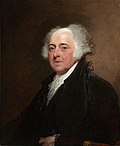 | John Adams | Vice President | Foreign service [h] | Continental Congress | State legislator [i] | Lawyer, farmer | Massachusetts |
| 3 |  | Thomas Jefferson | Vice President | Secretary of State | Foreign service [h] | Congressman | Planter, lawyer, land surveyor, architect | Virginia |
| 4 | 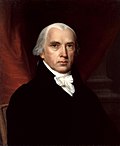 | James Madison | Secretary of State | U.S. representative | Constitutional Convention | State legislator [i] | Planter | Virginia |
| 5 |  | James Monroe | Secretary of State | Foreign service [h] | State governor | U.S. senator | Planter, lawyer | Virginia |
| 6 |  | John Quincy Adams | Secretary of State | Foreign service [h] | U.S. senator | State legislator [i] | Lawyer | Massachusetts |
| 7 |  | Andrew Jackson | Out of office [e] | U.S. senator | Military | U.S. senator | Lawyer, military officer | Tennessee |
| 8 |  | Martin Van Buren | Vice President | Secretary of State | State governor [j] | U.S. senator | Lawyer | New York |
| 9 |  | William Henry Harrison | Out of office [e] | Foreign service [h] | U.S. senator/U.S. representative | Territorial governor | Military | Ohio |
| 10 | 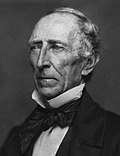 | John Tyler | Vice President [k] | U.S. senator | State governor | U.S. representative | Lawyer | Virginia |
| 11 |  | James K. Polk | Out of office [e] | State governor | Speaker of the House | U.S. representative | Lawyer, planter | Tennessee |
| 12 |  | Zachary Taylor | Military | — | — | — | Military | Kentucky |
| 13 |  | Millard Fillmore | Vice President [l] | State office | Out of office [e] | U.S. representative | Lawyer | New York |
| 14 |  | Franklin Pierce | Out of office [e] | Military | U.S. senator | U.S. representative | Lawyer | New Hampshire |
| 15 |  | James Buchanan | Foreign service [h] | Out of office [e] | Secretary of State | U.S. senator | Lawyer | Pennsylvania |
| 16 |  | Abraham Lincoln | Out of office [e] | U.S. representative | State legislator [i] | Military | Lawyer, land surveyor | Illinois [m] |
| 17 |  | Andrew Johnson | Vice President [n] | Military governor [o] | U.S. senator | State governor | Tailor | Tennessee |
| 18 | 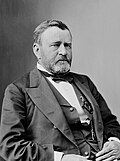 | Ulysses S. Grant | Military | — | — | — | Military | Illinois [p] |
| 19 |  | Rutherford B. Hayes | State governor | Out of office [e] | State governor | U.S. representative | Lawyer | Ohio |
| 20 |  | James A. Garfield | U.S. representative | Military | State legislator [i] | — | Ordained minister, lawyer, teacher | Ohio |
| 21 |  | Chester A. Arthur | Vice President [q] | Out of office [e] | Federal office [r] | Out of office | Lawyer, teacher, tariff collector | New York |
| 22 |  | Grover Cleveland | State governor | Local office [s] | — | — | Lawyer | New York |
| 23 |  | Benjamin Harrison | Out of office [e] | U.S. senator | Out of office | Military | Court reporter | Indiana |
| 24 |  | Grover Cleveland | Out of office [e] | President | State governor | Local office [s] | Lawyer | New York |
| 25 |  | William McKinley | State governor | U.S. representative | Military | — | Lawyer | Ohio |
| 26 | 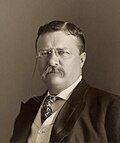 | Theodore Roosevelt | Vice President [t] | State governor | Military | Federal office [r] [u] | Historian, public servant, naturalist, military officer, policeman, rancher | New York |
| 27 |  | William Howard Taft | Secretary of War | Territorial governor [v] | Judicial [w] | Federal office [r] [x] | Lawyer, dean | Ohio |
| 28 |  | Woodrow Wilson | State governor | — | — | — | Academic [y] | New Jersey |
| 29 |  | Warren G. Harding | U.S. Senator | Out of office [e] | State legislator [i] | — | Journalist, publisher | Ohio |
| 30 |  | Calvin Coolidge | Vice President [z] | State governor | State office | State legislator [i] | Lawyer | Massachusetts [aa] |
| 31 |  | Herbert Hoover | Secretary of Commerce | Out of office [e] [ab] | Federal office [r] [ac] | — | Businessman, mining engineer | California |
| 32 |  | Franklin D. Roosevelt | State governor | Out of office [e] | Federal office [r] [u] | State legislator [i] | Lawyer | New York |
| 33 |  | Harry S. Truman | Vice President [ad] | U.S. senator | County commissioner (county court) | Military | Farmer | Missouri |
| 34 |  | Dwight D. Eisenhower | Military | — | — | — | Military officer, President of Columbia University | Kansas |
| 35 |  | John F. Kennedy | U.S. senator | U.S. representative | Military | — | Journalist, naval officer | Massachusetts |
| 36 |  | Lyndon B. Johnson | Vice President [ae] | U.S. senator | U.S. representative | Federal office [r] [af] | Teacher, naval officer, rancher | Texas |
| 37 |  | Richard Nixon | Out of office [e] | Vice President | U.S. senator | U.S. representative | Lawyer, naval officer | California |
| 38 |  | Gerald Ford | Vice President [ag] | U.S. representative | Military | — | Lawyer, naval officer | Michigan [ah] |
| 39 |  | Jimmy Carter | Out of office [e] | State governor | State legislator [i] | Military | Farmer, naval officer | Georgia |
| 40 |  | Ronald Reagan | Out of office [e] | State governor | — | Military | Actor, Screen Actors Guild president | California [ai] |
| 41 | 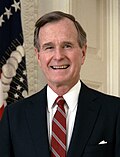 | George H. W. Bush | Vice President | Out of office [e] | Federal office [r] [aj] | Foreign service [h] | Businessman, naval aviator | Texas [ak] |
| 42 |  | Bill Clinton | State governor | State attorney general | — | — | Lawyer, law professor at the University of Arkansas | Arkansas |
| 43 | 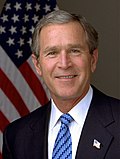 | George W. Bush | State governor | Out of office [e] [8] | Military [9] | — | Businessman, Air National Guard pilot | Texas |
| 44 |  | Barack Obama | U.S. senator | State legislator [i] | — | — | Lawyer, law professor at the University of Chicago [al] | Illinois [am] |
| 45 | 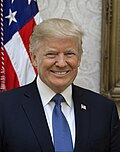 | Donald Trump | — | — | — | — | Businessman, real estate developer, reality television personality | New York [an] |
| 46 |  | Joe Biden | Out of office [e] | Vice President | U.S. senator | Local office [s] | Lawyer | Delaware |
| 47 |  | Donald Trump | Out of office [e] | President | — | — | Businessman, real estate developer, reality television personality | Florida |